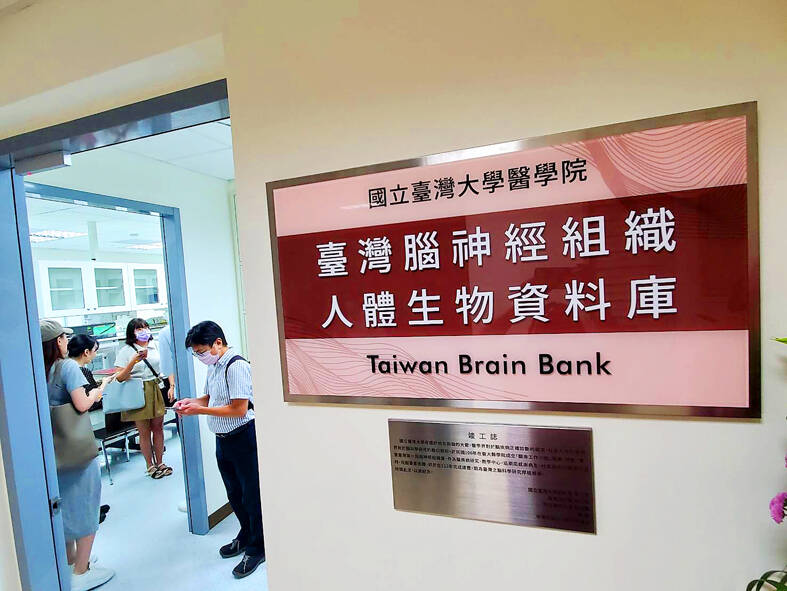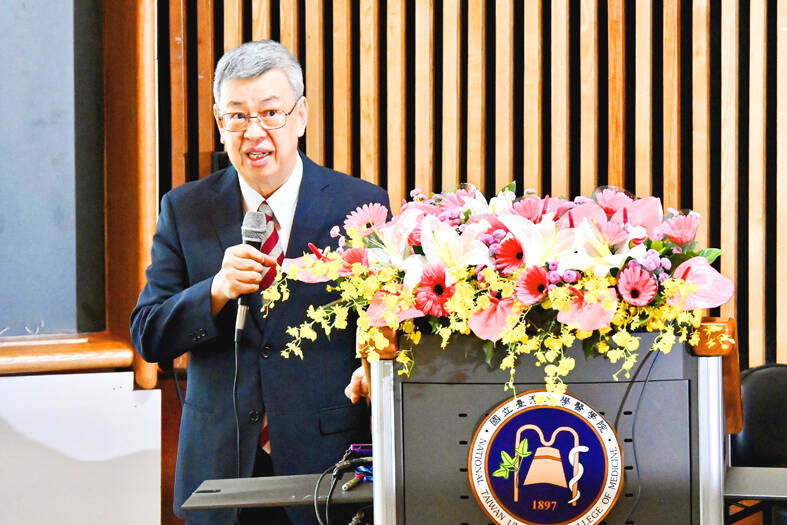The nation’s first brain bank opened in Taipei yesterday, with Premier Chen Chien-jen (陳建仁) expressing his hopes that it would also make Taiwan a bellwether in neuroscience in Asia.
National Taiwan University’s (NTU) College of Medicine yesterday hosted a plaque unveiling ceremony for the Taiwan Brain Bank, which was attended by Chen, National Health Research Institutes president Sytwu Huey-kang (司徒惠康), NTU vice president Chang Shan-chwen (張上淳), Minister of Health and Welfare Hsueh Jui-yuan (薛瑞元) and Taiwan Brain Bank Association chairman Hsieh Sung-tsang (謝松蒼).
“Many chronic diseases affecting the nation’s increasingly aging population — such as dementia and Parkinson’s disease — are related to the brain,” Chen said.

Photo: Lin Hui-chin, Taipei Times
“The establishment of the Taiwan Brain Bank would help scientists study various cerebral diseases, which could help prevent people from getting them and enable medical experts to begin patients’ treatment early,” he said. “This would also make Taiwan a bellwether in brain science in Asia.”
The brain bank belongs to the nation, not NTU, Chang said.
“Today is only the beginning, and the brain bank cannot sustain itself with the budget allocated to the medical school alone. We are calling for long-term financial support from the government,” Chang said.

Photo: George Tsorng, Taipei Times
In the past, the focus of neuroscience was studying data gathered through neuroimaging, Hsueh said, adding that the brain bank would allow neuroscientists to analyze brains directly.
“We understand that funding is needed to maintain the operations of the brain bank, so part of the technology budget would be used for this purpose. Another challenge would be to encourage voluntary donations of brains, which requires joint cooperation of the medical community and different patient groups,” Hsueh said.
“People need to know the importance of organ donations and give their consent to donate while they are alive. Their families should also give their consent,” he said.
There are about 150 brain banks worldwide, Hsieh said, adding that having brain banks is an indicator of prosperity.
“Unlike brain banks in other countries that were established by the government, the Taiwan Brain Bank was initiated by patients and their relatives who wanted to contribute by donating their brains for research,” Hsieh said.
Hsieh began leading a workforce to establish the brain bank in 2017, when they faced the challenge of finding a legal basis for such an institution. The problem was resolved after the Ministry of Health and Welfare issued interpretations of relevant regulations.
The brain bank also spent three years training its personnel and installing relevant facilities before it was officially established yesterday.

CHAOS: Iranians took to the streets playing celebratory music after reports of Khamenei’s death on Saturday, while mourners also gathered in Tehran yesterday Iranian Supreme Leader Ayatollah Ali Khamenei was killed in a major attack on Iran launched by Israel and the US, throwing the future of the Islamic republic into doubt and raising the risk of regional instability. Iranian state television and the state-run IRNA news agency announced the 86-year-old’s death early yesterday. US President Donald Trump said it gave Iranians their “greatest chance” to “take back” their country. The announcements came after a joint US and Israeli aerial bombardment that targeted Iranian military and governmental sites. Trump said the “heavy and pinpoint bombing” would continue through the week or as long

TRUST: The KMT said it respected the US’ timing and considerations, and hoped it would continue to honor its commitments to helping Taiwan bolster its defenses and deterrence US President Donald Trump is delaying a multibillion-dollar arms sale to Taiwan to ensure his visit to Beijing is successful, a New York Times report said. The weapons sales package has stalled in the US Department of State, the report said, citing US officials it did not identify. The White House has told agencies not to push forward ahead of Trump’s meeting with Chinese President Xi Jinping (習近平), it said. The two last month held a phone call to discuss trade and geopolitical flashpoints ahead of the summit. Xi raised the Taiwan issue and urged the US to handle arms sales to

BIG SPENDERS: Foreign investors bought the most Taiwan equities since 2005, signaling confidence that an AI boom would continue to benefit chipmakers Taiwan Semiconductor Manufacturing Co’s (TSMC, 台積電) market capitalization swelled to US$2 trillion for the first time following a 4.25 percent rally in its American depositary receipts (ADR) overnight, putting the world’s biggest contract chipmaker sixth on the list of the world’s biggest companies by market capitalization, just behind Amazon.com Inc. The site CompaniesMarketcap.com ranked TSMC ahead of Saudi Aramco and Meta Platforms Inc. The Taiwanese company’s ADRs on Tuesday surged to US$385.75 on the New York Stock Exchange, as strong demand for artificial intelligence (AI) applications led to chip supply constraints and boost revenue growth to record-breaking levels. Each TSMC ADR represents

Pro-democracy media tycoon Jimmy Lai’s (黎智英) fraud conviction and prison sentence were yesterday overturned by a Hong Kong court, in a surprise legal decision that comes soon after Lai was jailed for 20 years on a separate national security charge. Judges Jeremy Poon (潘兆初), Anthea Pang (彭寶琴) and Derek Pang (彭偉昌) said in the judgement that they allowed the appeal from Lai, and another defendant in the case, to proceed, as a lower court judge had “erred.” “The Court of Appeal gave them leave to appeal against their conviction, allowed their appeals, quashed the convictions and set aside the sentences,” the judges